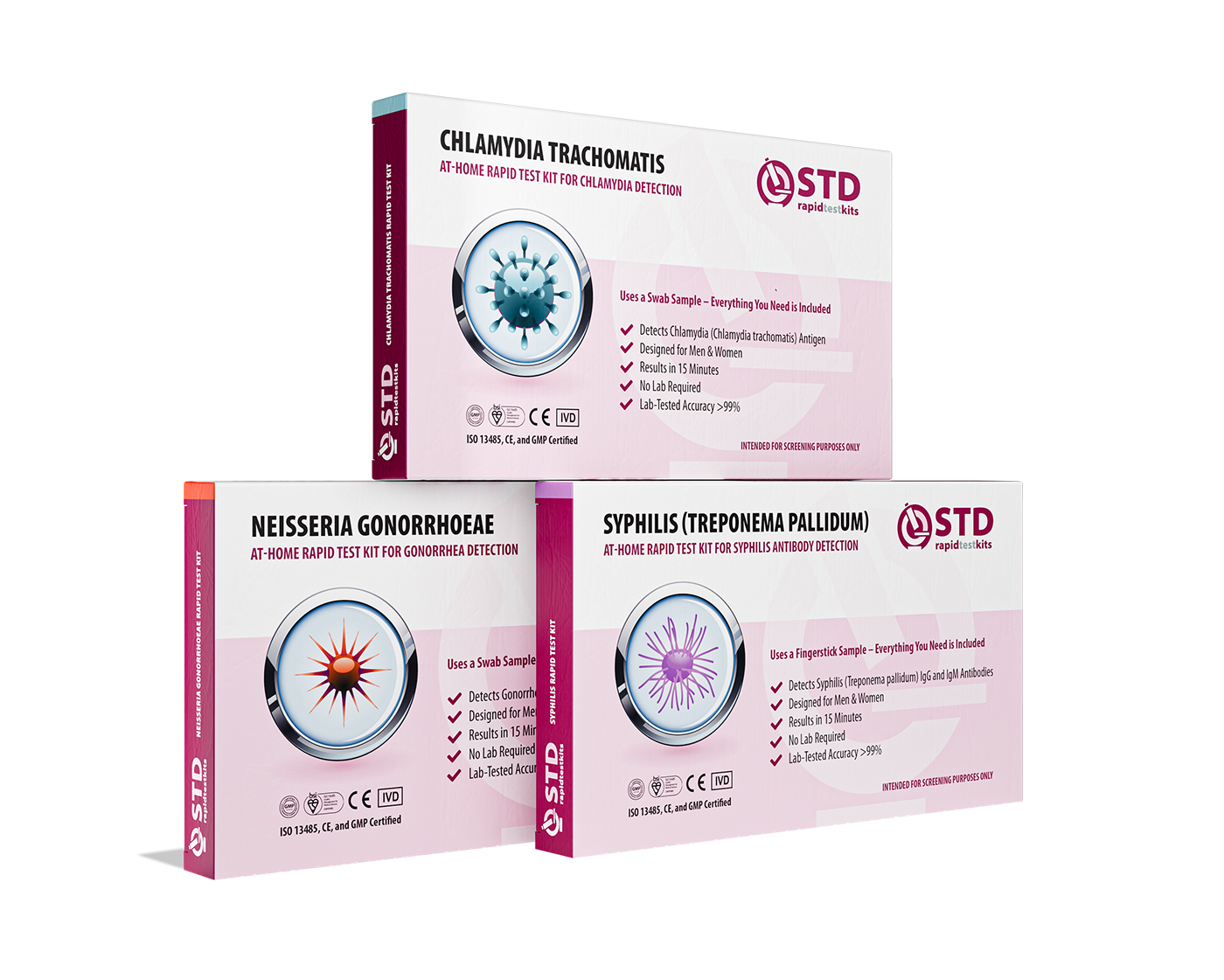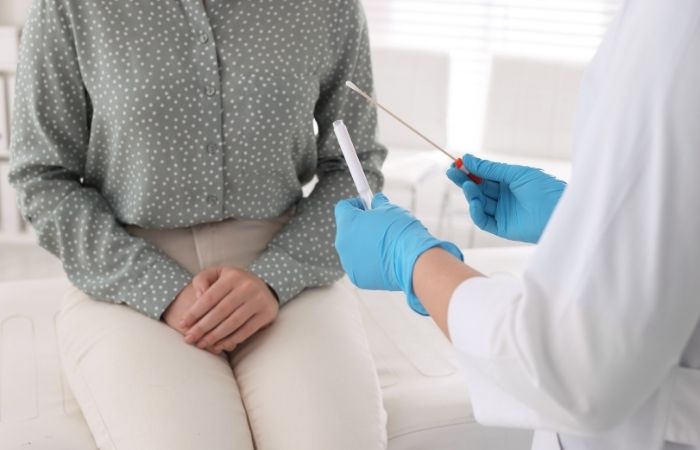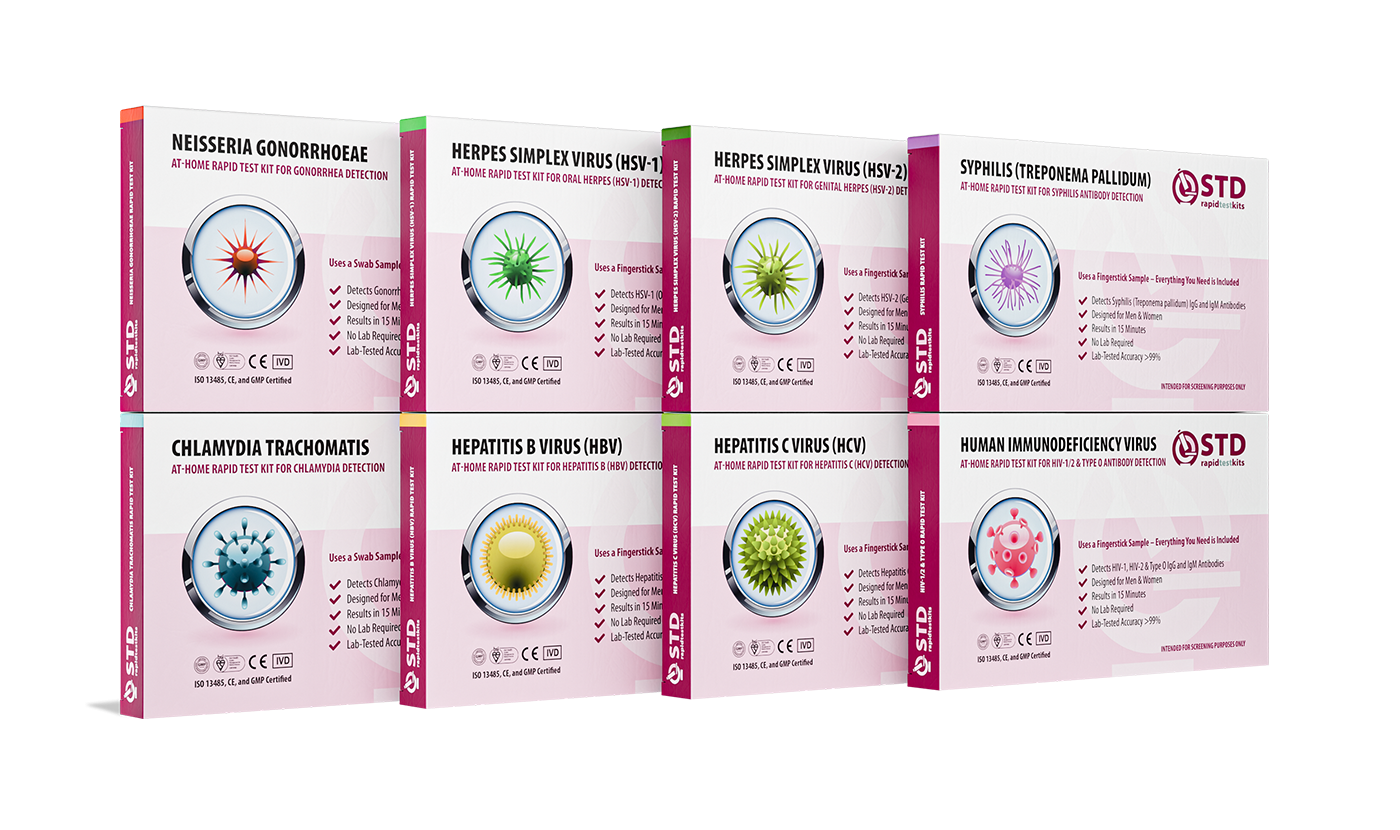Can You Get an STD in a Monogamous Marriage? Yes, Here’s How
Why “Monogamy Means Safe” Is a Dangerous Assumption
The idea that being in a monogamous relationship somehow protects you from STDs is pervasive. From health class in high school to advice on dating as an adult, monogamy is the magic bullet prophylactic touted as the ultimate protector. But let's pull back the curtain.
The Cultural Programming
Since the early days of public health messaging, monogamy has been framed as a behavior choice that minimizes risk. The CDC, WHO, and other health bodies have long recommended “mutual monogamy with an uninfected partner” as a strategy for STD prevention. But there’s a big asterisk next to that advice, one most people don’t notice.
That "uninfected partner" part? It assumes that both people are starting out disease-free and staying completely exclusive. But according to CDC data, nearly 1 in 5 people in the U.S. has an STD at any given moment, and many of these infections (like chlamydia or herpes) can be completely asymptomatic. So if neither partner is tested before ditching condoms, the relationship might be monogamous, but it might not be safe.
Serial Monogamy = Serial Risk
Then there’s the modern relationship pattern many people follow: serial monogamy. You’re faithful to one partner… until you break up. Then you move on to the next exclusive relationship. Rinse, repeat. It feels morally sound, but in reality, it can accumulate the same risks as non-monogamy, especially if testing and safe sex don’t happen between partners.

The Comforts and Benefits of Monogamy, With a Catch
Before we totally drag monogamy through the mud, let’s acknowledge why people cling to it, not just emotionally, but biologically and practically.
Emotional Security & Intimacy
For many, monogamy offers a sense of emotional safety. The psychological comfort of knowing your partner is “yours” and that neither of you is out exploring other sexual options can be grounding, even healing. When it works, monogamy fosters trust, intimacy, and consistency, three things that feel incredibly stabilizing in a world full of uncertainty.
That sense of stability often translates to increased sexual satisfaction, more open communication, and lower stress levels. When partners trust each other, they may feel more comfortable trying new things, being emotionally vulnerable, or discussing sexual needs. In short, monogamy can be a petri dish for deep sexual connection, when it's done right.
Health Benefits, Under the Right Conditions
In its ideal form, monogamy can reduce your exposure to STIs, if and only if both partners are:
- Tested before becoming exclusive.
- Truly exclusive.
- Free from latent infections like herpes or HPV, which can linger silently for months or years.
When those three criteria are met, the risk of STI transmission does decrease significantly. And that’s worth celebrating.
Simplicity and Routine
There’s also the benefit of routine: You don’t have to keep up with multiple partners’ sexual health, you don’t have to constantly negotiate condom use, and you don’t need a detailed spreadsheet of dates and test results. For many people, the reduced complexity of monogamy is a real win, just not a substitute for actual testing and transparency.
Order Now $129.00 $343.00 Check Your STD Status in Minutes
Test at Home with Remedium
7-in-1 STD Test Kit




For all 7 tests
The Silent Risks Inside Monogamy
Here’s where things get messy. Monogamy is only as safe as the people inside it, and we’re human. We lie. We cheat. We forget to get tested. And sometimes, we carry infections from relationships past into relationships present.
Cheating Happens (Even in “Good” Relationships)
Let’s rip off the Band-Aid: Infidelity is common. Depending on the survey, 15-25% of married individuals report cheating. That number goes up in younger, unmarried couples. And guess what? Most of those affairs are never disclosed, especially when they’re brief or perceived as meaningless.
So what does that mean? In a supposedly “safe” monogamous relationship, you could be exposed to an STD without ever knowing it. And because you’ve stopped using condoms and testing isn’t on your radar, you’re unlikely to catch it until symptoms (if any) appear.
Testing Drops Dramatically in Monogamous Relationships
Multiple studies show that people in monogamous relationships are less likely to get tested than single or non-monogamous individuals. Why? Because they think they don’t have to. In one study published in JAMA Network Open, researchers found that self-perceived monogamy was one of the strongest predictors of avoiding regular STD screenings, even when individuals had risk factors like past infections or multiple partners within a year.
The result? A perfect storm of false security + undetected infections.
Monogamy Doesn't Protect Against Dormant Infections
Even if both partners are faithful, some STDs don’t play by the rules. HPV and herpes can remain dormant for months or even years after the initial infection. So you or your partner could be carrying a virus from a previous relationship and not even know it. Monogamy might feel exclusive, but viruses don’t care about emotional boundaries. They only care about biology.

Practical Solutions to Protect Yourself in Monogamy
Now that we’ve dragged monogamy’s halo through the mud, let’s talk about what you can actually do to keep yourself safe, without turning into a cynical mess or demanding your partner take a lie detector test.
Test Before Trust
Before you go exclusive, test. Both of you. Full-panel STI screening. This isn't about suspicion; it's about responsibility. Even if you trust your partner, testing is like setting the baseline for your sexual health together. It's not just smart, it's sexy. It says, “I care about us enough to make sure we’re both healthy.”
And if you're already years deep into your relationship and haven’t tested in ages? It's not too late. Frame it as an act of love and self-care. Maybe even make a date of it.
For a discreet, stigma-free option, consider using an at-home STD test kit so you can screen from the privacy of your home, no awkward clinic waiting rooms or judgmental nurses.
Stop Using “Monogamy” as a Condom Substitute
Even if you're exclusive, barriers still matter, especially in the early months. If you haven’t both tested recently, don’t ditch the condoms just because you're “official.” Use them until you've both cleared full panels and had the kind of sexual health talk that would make a doctor blush.
Yes, condoms can be awkward. No, they’re not 100% foolproof. But they dramatically reduce the risk of transmitting infections like chlamydia, gonorrhea, and HIV. Monogamy doesn’t replace condoms, but monogamy plus testing can.
Create a Culture of Ongoing Honesty
Monogamy should be a dialogue, not a declaration. Set a precedent early on that sexual health is something you’ll continue to check in about, not just once when the relationship starts. If you or your partner ever decide to open the relationship (even temporarily), that needs to come with a renewed testing routine. Even something as simple as, “Hey, it’s been six months, want to do our STI tests again?” normalizes the idea that safety isn’t a one-and-done event.
Don’t Rely on Assumptions
- "I know they’re clean. They told me they were tested."
- "When? What panel? What were the results?"
Vague reassurances are not the same as medical confirmation. If someone bristles at the idea of testing or won't show results, that’s not trust, that’s a red flag. We need to move past the idea that asking for proof is offensive. In reality, it’s a gesture of mutual respect and empowerment.
Check Your STD Status in Minutes
Test at Home with RemediumOral Herpes Test Kit

 For Men & Women
For Men & Women Results in Minutes
Results in Minutes No Lab Needed
No Lab Needed Private & Discreet
Private & DiscreetOrder Now $33.99 $49.00
The Data Doesn’t Lie, Monogamy Isn’t Foolproof
Risky Comfort: The Drop in Testing
In a 2021 study published in Journal of Adolescent Health, researchers found that only 31% of young adults in monogamous relationships had been tested for STIs in the last year, compared to 57% of their non-monogamous counterparts. Why? Perceived safety. And that’s what gets people in trouble.
When people think they’re “safe,” they stop screening. But up to 80% of chlamydia cases are asymptomatic, especially in women. That means you can carry, spread, and suffer long-term effects like pelvic inflammatory disease without a clue.
Cheating and Hidden Risk
According to a 2018 survey from the Institute for Family Studies, 1 in 5 people in monogamous relationships admitted to cheating, with men slightly more likely to stray. But here’s the twist, only a fraction disclosed it to their partner, and even fewer got tested after.
So the person you trust most might be carrying an infection they don’t even know about, and you might be paying the price.
Dormant STIs: The Silent Saboteurs
Herpes, HPV, syphilis, and even HIV can sit silently in the body for weeks, months, or years. That means even if your current partner is faithful, they might have picked something up long before they met you, and now you’re part of the viral timeline.
Statistically, around 1 in 6 Americans between 14-49 has genital herpes, most without symptoms. HPV? Nearly every sexually active person will get it at some point unless vaccinated. That’s not a scare tactic, that’s a biological reality.

Experts and Real-Life Scenarios That’ll Make You Rethink Everything
Case Study #1: The Newlywed Wake-Up Call
Sarah and Jake (names changed) had been together for four years. Faithful, in love, and freshly married. Two months into married life, Sarah went in for her routine pap smear, and tested positive for HPV. She was devastated. Jake swore he hadn’t cheated. And after some digging, they realized he’d picked it up from a relationship years before and had no idea.
Even long-term monogamous relationships can harbor invisible infections. And because they’d assumed safety, they never tested each other before going raw.
Case Study #2: The Poly Couple That Tests More Than You
Then there’s Jasmine and Cole, a non-monogamous couple who date other people with strict protocols. They test every three months, use condoms with new partners, and share results with each other like it’s no big deal. Ironically, they’re statistically safer than many monogamous couples who don’t test, don’t ask, and don’t talk.
What the Experts Say
Dr. Emily Morse, sexologist and host of “Sex With Emily,” puts it bluntly:
“Monogamy doesn't mean safety. Communication, testing, and honesty do. Too many people stop asking questions because they assume the label protects them.”
Dr. Ina Park, a physician with the CDC and author of Strange Bedfellows: Adventures in the Science, History, and Surprising Secrets of STDs, agrees. She says that social norms often silence sexual health discussions, especially in relationships where people assume fidelity equals immunity.
Order Now $69.00 $147.00 Check Your STD Status in Minutes
Test at Home with Remedium
3-in-1 STD Test Kit




For all 3 tests
A Brief History of Monogamy’s Reputation as a Safety Net
To really understand how monogamy earned its protective reputation, we need to go back, a few centuries, actually.
Monogamy as Moral Armor
Historically, monogamy wasn't just a personal choice. It was a public health strategy, a religious ideal, and a tool for social control. In the 19th and 20th centuries, public health campaigns pushed monogamy as a moral solution to the growing threat of venereal diseases. “Clean living” was equated with monogamous heterosexual marriage. Anything else, sex work, homosexuality, premarital sex, was framed as deviant and disease-ridden.
Governments and religious institutions cemented the link between morality and sexual safety. If you were monogamous, you were “good”, and presumably clean. But that’s not science. That’s stigma wrapped in tradition.
The Rise of Serial Monogamy
As divorce and dating norms evolved in the 20th century, people began engaging in serial monogamy, a parade of exclusive relationships, one after the other. But while the emotional rules changed, the sexual health advice didn’t. Monogamy kept its halo, even as the behaviors under that label started to shift. The disconnect between social labels and actual behaviors is part of what’s made monogamy so misleading as a health strategy.

The Future of Relationship Health, Monogamy, Redefined
If we want safer relationships, we have to upgrade our definition of “safe.” Monogamy doesn’t have to die, it just needs a modern makeover.
Radical Transparency
The future of monogamy is not just about exclusivity, it’s about transparency. New norms are emerging that center honesty, shared test results, and the understanding that even faithful partners can carry STIs. Apps like OKCupid and Bumble now allow users to list recent testing dates or sexual health statuses, reflecting a growing awareness that talking about STIs should be as normal as talking about birth control.
Normalizing At-Home Testing
With the rise of at-home STD test kits, routine testing is becoming easier, cheaper, and less stigmatized. The idea of couples testing together, before ditching condoms or opening their relationship, is a trend that will only grow. Soon, asking, “When were you last tested?” will be as basic as asking, “What are you into?” And thank god for that.
Safer Doesn't Mean Sexless
Being cautious doesn’t mean being afraid. The future of monogamy doesn’t look like fear-based purity, it looks like empowered pleasure. You get to enjoy your partner, trust your intimacy, and still be smart about your health. That’s not paranoia. That’s maturity.
Check Your STD Status in Minutes
Test at Home with Remedium10-in-1 STD Test Kit

 For Women
For Women Results in Minutes
Results in Minutes No Lab Needed
No Lab Needed Private & Discreet
Private & DiscreetOrder Now $189.00 $490.00
For all 10 tests
Applying the Truth, What You Should Do Right Now
Let’s get practical. You’re monogamous. You believe your relationship is safe. Great! Now let’s make sure it actually is.
Here’s what to do, starting tonight
- Have “the talk.” Not the “What are we?” talk. The “Have you ever been tested? What were the results?” talk.
- Test together. Even if you’ve been together for years, it’s never too late. If going to a clinic feels awkward, use a discreet at-home kit and do it from the comfort of your own bed (literally).
- Make testing routine. Every 6 to 12 months isn’t excessive, it’s smart. Especially if either of you has new partners, even just once.
- Stay alert to symptoms. Unusual discharge, pain, sores, or itching? Don’t assume it’s “just a yeast infection” or “probably shaving bumps.” Get checked.
- Talk about your pasts. Not in a jealous way, in a factual, compassionate way. Understanding what you both bring into this relationship is part of building something strong.
Monogamy isn’t a free pass. It’s a partnership, and that means shared responsibility for your bodies, your safety, and your truth.
How the Monogamy Myth Impacts the Medical World
Health Systems Lean on Labels
In many healthcare settings, monogamous patients are assumed to be low risk. That means fewer routine tests, fewer sexual health discussions, and sometimes even insurance hurdles for full STD panels. This systemic bias reflects, and reinforces, the idea that monogamy equals immunity. But that leaves huge gaps. People in “exclusive” relationships who are actually at high risk often fall through the cracks.
Sex Ed Reinforces the Lie
School-based sex ed programs in the U.S. and many parts of the world still emphasize abstinence and monogamy as primary prevention. But most don’t teach students how to talk about STI testing, how to recognize asymptomatic infections, or how to navigate sexual honesty. That means millions of adults grew up thinking their monogamy would shield them. Instead, it made them less likely to protect themselves.
The Clinical Bias Hurts Women More
Women, in particular, are often dismissed or misdiagnosed when they present with STI symptoms, especially if they describe themselves as monogamous. Conditions like trichomoniasis, bacterial vaginosis, and even herpes are frequently mistaken for yeast infections or UTIs, delaying proper treatment. Why? Because doctors often think, “She’s in a relationship. She’s not at risk.” That kind of thinking needs to go.

Personal Stories That Shatter the Monogamy Safety Myth
“I Got Chlamydia From My Fiancé, Who Swore He Was Faithful”
“I thought we were solid. We had been together for two years, never used condoms after the first month. Then I got diagnosed with chlamydia after a painful urinary infection. My doctor said it had to be recent. I confronted him. He cried. He admitted to a one-night stand at a conference six months ago. He didn’t use protection. He never told me. I still have pelvic pain to this day.”
This is not rare. It’s the quiet epidemic happening behind closed doors in supposedly “safe” relationships.
“I Was the One Who Cheated, And I Infected My Girlfriend”
In a Reddit confession thread, one user shared
“I cheated while drunk, never told her, and gave her gonorrhea. She thought she got it from a toilet. I let her believe that. I hate myself for it. We’re still together, and I test regularly now, but I’ll never forgive myself.”
This kind of deceit, even when unintentional, is what makes untested monogamy so dangerous.
“We Test Together Every Six Months, And We’re Monogamous”
Not all stories are horror stories. One couple shared online:
“We’ve been monogamous for seven years. We still get tested every six months, just in case. It’s our little ritual. We make a day of it, go get tested, then get brunch. We do it because we know monogamy is about behavior, not assumptions. And honestly? It brings us closer.”
It’s possible to keep both the commitment and the caution. You just have to choose it.
Order Now $149.00 $392.00 Check Your STD Status in Minutes
Test at Home with Remedium
8-in-1 STD Test Kit




For all 8 tests
Common Misconceptions About Monogamy and STIs
“We’re monogamous, so we don’t need to use condoms.”
This is one of the most dangerous lies monogamous couples tell themselves. Unless both partners are recently tested and fully transparent about past risks, ditching condoms early can open the door to STIs.
“If my partner had something, they’d show symptoms.”
Wrong again. Most STIs are asymptomatic, especially in their early stages. HPV, chlamydia, gonorrhea, and even HIV can go unnoticed for months, or forever, without testing.
“Only people who sleep around get STIs.”
Nope. STIs don’t care about your body count. One unprotected encounter is enough. Plenty of people contract infections from their first partner, or from someone who swore they were clean.
“Talking about STDs means I don’t trust my partner.”
Actually, it means you respect them. If you’d wear a seatbelt while driving with someone you love, why wouldn’t you take similar precautions when sharing your body?

FAQs
1. Can I get an STD if we’re both monogamous?
Yes, especially if neither of you was tested before going exclusive. Some infections can be dormant and passed unknowingly.
2. Should I still get tested if I trust my partner?
Absolutely. Trust and testing aren’t mutually exclusive. It’s about safety, not suspicion.
3. What’s the safest way to start a monogamous relationship?
Test together before ditching protection, then talk openly about any past risks. Consider at-home testing options like STD Rapid Test Kits for privacy and ease.
4. Is serial monogamy risky?
Yes. Having multiple monogamous relationships over time without testing in between increases your cumulative STI risk.
5. How often should I test in a monogamous relationship?
Every 6–12 months is a smart interval, even if there’s no cheating. Also test anytime symptoms appear.
6. What if my partner refuses to get tested?
That’s a red flag. Your health matters. Refusing to test shows a lack of care for shared responsibility.
7. Can I get an STD from a partner who hasn’t had sex in years?
Yes. Some STIs linger in the body long after infection. Dormant doesn’t mean gone.
8. What’s the best at-home STD test for couples?
STD Rapid Test Kits offers reliable, confidential testing you can do together at home. It's a game-changer for people who hate clinics.
9. Do condoms protect against all STDs?
Not all, skin-to-skin infections like herpes or HPV can still transmit, but they’re highly effective for most.
10. What’s more important, monogamy or testing?
Testing. Every time. Monogamy is a behavior. Testing is a fact.
Trust Isn’t a Strategy, It's a Responsibility
It’s time we stop using monogamy as a shortcut to sexual safety. Being exclusive is beautiful, but it’s not magical. It doesn't override biology. It doesn't erase your past. And it definitely doesn't exempt you from the responsibility of keeping yourself and your partner protected. So if you’re in a monogamous relationship, ask yourself: Are we actually safe, or are we just assuming we are?
Swap assumptions for action. Test together. Talk openly. Protect your peace with the same energy you protect your heart. Because safety in love isn’t about being innocent. It’s about being informed. And if you’re ready to take that step? There’s no easier way than using an at-home STD test kit from STD Rapid Test Kits. Confidential, accurate, and judgment-free. Because nothing says “I love you” like knowing your status, together.
Resources
1. Our Ancestors Stopped Having Open Relationships Because of STIs – Teen Vogue
3. STI Screening Recommendations – CDC
4. A Comparison of Sexual Health History and Practices – PubMed
5. Re-examining the Effectiveness of Monogamy – ScienceDirect










